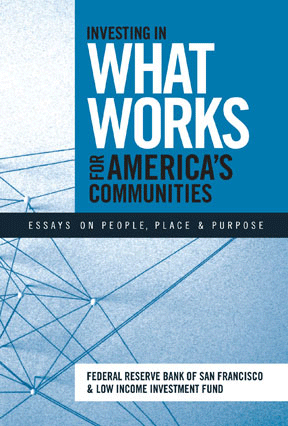One in six Americans now lives in poverty — the highest level in half a century. Poverty has spread beyond cities to suburbs and rural communities and is being transferred from one generation to the next. At the same time, we know more about what it takes to build vibrant communities and to help people lead healthy, productive lives. We also know that expanding access to affordable housing, good schools, transportation, jobs, and even supermarkets and parks, can mean better health and life outcomes for people and revitalize whole communities.
Investing in What Works for America’s Communities is a new book that calls on leaders from the public, private, and nonprofit sectors to build on what we know is working to move the needle on poverty. The book’s impressive list of authors represents a broad range of sectors including federal agencies, philanthropy, housing academia, health, and the private sector. This collection of essays provides dozens of innovative ideas that can bring new opportunities to America’s struggling communities. It calls on leaders, from the public, private, and nonprofit sectors to recognize that they can work smarter and achieve more by working together.
CONTENTS
FOREWORD
- Building Sustainable Communities
Elizabeth A. Duke, Governor, Board of Governors of the Federal Reserve System
I COMMUNITY DEVELOPMENT: PAST AND PRESENT
- The Past, Present, and Future of Community Development in the United States
Alexander von HoffmanHarvard University - The Continuing Evolution of American Poverty and Its Implications for Community Development
Alan Berube, Brookings Institution - Crossing Over to an Improved Era of Community Development
Eric Belsky, Harvard University and Jennifer Fauth, City of New York
II OPEN FORUM: VOICES AND OPINIONS FROM LEADERS IN POLICY, THE FIELD, AND ACADEMIA FROM LEADERS IN POLICY
- Fighting Poverty through Community Development
Shaun Donovan, U.S. Secretary of Housing and Urban Development, Arne Duncan, U.S. Secretary of Education, Kathleen Sebelius, U.S. Secretary of Health and Human Services - America’s Tomorrow: Race, Place, and the Equity Agenda
Angela Glover Blackwell, PolicyLink - People Transforming Communities. For Good.
Angela Blanchard, Neighborhood Centers, Inc. - Future of Community Development: How CDFIs Can Best Ride the Impact Investing Wave
Antony Bugg-Levine, Nonprofit Finance Fund - Community Development in Rural America: Collaborative, Regional, and Comprehensive
Cynthia M. Duncan, AGree - It Takes a Neighborhood: Purpose Built Communities and Neighborhood Transformation
Shirley Franklin, Purpose Built Communities and David Edwards, IBM Corporation - The Future of Community Development
Paul Grogan,The Boston Foundation - From Community to Prosperity
Ben Hecht, Living Cities - Owning Your Own Job Is a Beautiful Thing: Community Wealth Building in Cleveland, Ohio
Ted Howard, Democracy Collaborative - Why Health, Poverty, and Community Development Are Inseparable
Risa Lavizzo-Mourey, Robert Wood Johnson Foundation - The World Has Changed and So Must We
Clara Miller, F. B. Heron Foundation - Getting to Scale: The Need for a New Model in Housing and Community Development
Sister Lillian Murphy, Mercy Housing and Janet Falk, Mercy Housing - What Problem Are We Trying to Solve?
Mark A. Pinsky, Opportunity Finance Network - Transit-Oriented Development Is Good Community Development
John Robert Smith, Reconnecting America and Allison Brooks, Reconnecting America - Household and Community Financial Stability: Essential and Interconnected
Jennifer Tescher, Center for Financial Services Innovation - Assessing Health Effects of Community Development
Nancy E. Adler, University of California, San Francisco - Deep Democracy Is Not Meetings That Last Forever: Community Development Next
Xavier de Souza Briggs, Massachusetts Institute of Technology and J. Phillip Thompson, Massachusetts Institute of Technology - Rules, Not Resources
Mark Calabria, Cato Institute - Our History with Concentrated Poverty
Peter Edelman, Georgetown University Law Center - Crime and Community Development
Ingrid Gould Ellen, New York University - Early Childhood Development: Creating Healthy Communities with Greater Efficiency and Effectiveness
Gabriella Conti, University of Chicago and James J. Heckman, University of Chicago - Mobilizing Science to Reduce Intergenerational Poverty
James M. Radner, University of Toronto and Jack P. Shonkoff, Harvard University
III MAPPING THE FUTURE: SYNTHESIZING THEMES AND IDEAS FOR NEXT STEPS
- Integration and Innovation in a Time of Stress: Doing the Best for People and Place
Ellen Seidman, Visiting Scholar at the Federal Reserve Bank of San Francisco - Routinizing the Extraordinary
David Erickson, Federal Reserve Bank of San Francisco, Ian Galloway, Federal Reserve Bank of San Francisco and Naomi Cytron, Federal Reserve Bank of San Francisco - Inflection Point: New Vision, New Strategy, New Organization
Nancy O. Andrews, Low Income Investment Fund and Nicolas Retsinas, Harvard Business School





